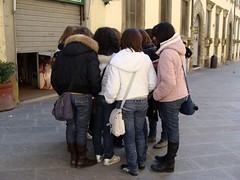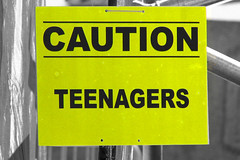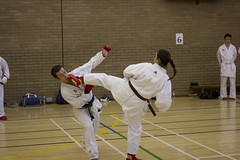When my first young-adult
mystery came out last month, many people asked me how writing mysteries
for teenagers is different from writing mysteries for adults. I
answered that, as far as I could see, it's not all that different. I
didn't dumb down the plot at all--
Fighting Chance is a whodunit,
and I wanted to make interpreting clues and identifying bad guys just as
challenging as it is in the whodunits I write for
Alfred Hitchcock's Mystery Magazine. As for characterization, the central characters in
Fighting Chance
are younger than the ones in my other mysteries, but I didn't try to
make them less complex. I've taught young people long enough to know
they're fully capable of following complicated plots and understanding
three-dimensional characters. Setting, theme, other elements of
fiction--again, I didn't see any need to make adjustments.
Language, though--that one raised some questions.

Some
of those questions related to craft. Could I create a convincing voice
for my protagonist, a seventeen-year-old boy who loves sports but
doesn't much care for school? (In fact, his voice seemed to come to me
naturally. Maybe I should be concerned.) Could I avoid outdated slang,
as well as slang so cutting-edge it might fade from fashion by the time
the book made it into print? What about minority characters? I've read a
number of YA novels written by other middle-aged white ladies, and
their attempts to write dialogue for streetwise African-American
teenagers have often made me cringe. Could I have a diverse cast of
characters without making similar blunders?
And then there's the issue of profanity.
For
some YA authors, apparently, it's not an issue at all. A couple of
years ago, when I went to a YA panel at a mystery conference, one author
lamented that some middle-school librarians won't carry her novel
because its title contains a certain word--I'd rather not say which one.
The other panelists sympathized. It's ridiculous, they said, for
librarians and teachers to fuss about this word and that word. After
all, kids today are smart. They know what all the words mean. And, as
writers, we need to keep it real.
The panelists
made some legitimate points. Yes, teenagers today are smart. Yes, they
know what all the words mean. The thing is, too many decades ago, when I
was a teenager myself, we knew what all the words mean, too. I still
remember the first time I heard one of my contemporaries use what I'll
refer to as the F-word. I was chatting with a group of friends when
Joanne casually dropped the word into the conversation. The rest of us
reacted with stunned silence--not because we didn't know what the word
meant, but because we did. We just chose not to use it, because we
thought it was crude.
That opinion seems to have faded.
I don't have any supporting data I can cite, but it seems safe to say
that most people today use profanity more freely than most people did
thirty or forty years ago. I think that's probably true for people of
all ages, not only for teenagers.

Why
did people change their opinions about which words are too crude to
use? Again, I can't cite supporting data, but I suspect books, movies,
and other media led the way. That's definitely where I first encountered
many of the words that now slip into my speech more easily than they
used to, words spoken by clever and likable characters on the page or
the screen, words I heard so often that they lost their shock value and
began to seem like normal, acceptable things said by perfectly nice
people. So when we say the language in YA novels should keep it real,
perhaps we should remember that books probably don't just passively
reflect reality. Probably, they also help shape it. If today's teenagers
use more crude language than the teenagers in my day did, it's probably
partly because of the movies they see, the music they listen to, and
the books they read. And if that's true, maybe YA authors need to think
carefully about the kind of influence they want their books to have.
Or
maybe it's no big deal. After all, we're just talking about words. If
today's teenagers use language once considered crude, so what? What's
wrong with crude language? I won't try to make a full argument here, but
I encourage you to read an essay by Barbara Lawrence, "Four-Letter
Words Can Hurt You"
(http://talkingtok.wikispaces.com/file/view/4+letter+words.pdf).
Lawrence argues that many crude words dehumanize people in general, and
women in particular, by reducing them to purely physical terms.
I'll
provide an example of a crude phrase that does exactly that, an
expression Lawrence doesn't discuss. When did it become all right to say
"knocked up"? I've heard several television comedians use that
expression recently, and this one still shocks me. Two human beings come
together to create a new life, in what should be an affirmation of love
and commitment and faith in the future. And these comedians reduce this
act to "knocked up"? Now it's a violent act, a victory of the strong
over the weak, an assertion of a man's power to impose himself on a
woman. I'm sorry. I think I've got a pretty good sense of humor, and I
know political correctness can go too far. But I don't think "knocked
up" is cute or funny. I think it's ugly. And I think that, as a YA
author, I have a responsibility to refrain from doing anything that
might encourage young people to think this ugly expression, or any other
ugly expression, is okay. I think I have a responsibility to make
careful choices, in the hope that any influence I might have will
encourage my young readers to make careful choices, too.

So
what standards should guide an author making choices about what sort of
language to use in a YA mystery? Yes, we want to keep it real. But for
any fiction writer--YA or otherwise, mystery or otherwise--realism isn't
the only relevant consideration. My YA mystery is set in a small town
in Virginia. If I were intent only on making dialogue realistic, my
teenaged characters would say "sir" and "ma'am" whenever they address
adults. I chose not to let them do that.
When I moved
from Ohio to Virginia, I was suspicious when my Lynchburg College
students kept addressing me as "ma'am"--"Yes, ma'am," "I'll have that
essay done tomorrow for sure, ma'am." At first, I thought they were
being sarcastic, implying I was as dictatorial as a drill sergeant--in
Cleveland, almost nobody outside the military says "ma'am." Eventually, I
realized that these students say "ma'am" because they were raised to
say it, that they were being respectful, not sarcastic.I was stunned. I
was used to student sarcasm and knew how to handle it, but respect left
me blinking in confusion. And when I wrote
Fighting Chance, I
decided to keep "sir" and "ma'am" to a minimum. I felt that, realistic
as these expressions might be in a novel set in Virginia, they might not
feel realistic to readers in other parts of the country.
That's
the sort of decision fiction writers make about language. After all, if
we were aiming only for realism, all the dialogue we write would be
studded with "um" and "er" much more often, and our characters would
constantly be saying "like" and "you know."" Unless we're trying to
create some sort of comic effect, we usually edit such stumbles from the
dialogue we write, along with the repetitions and qualifiers that make
most real speech far from vivid and entertaining.
I'm reminded of a famous statement from William Wordsworth's "Preface" to the second edition of
Lyrical Ballads.
(Yes, I know. If you hear reports of earthquakes in Grasmere today,
they're undoubtedly caused by Wordsworth spinning in his grave because
he never intended his words to be used in this context.) Wordsworth says
the language of poetry should be "as far as is possible, a selection of
the language really used by men" [and women], and "that this selection,
wherever it is made with true taste and feeling, will of itself form a
distinction far greater than would at first be imagined, and will
entirely separate the composition from the vulgarity and meanness of
ordinary life."
How about that as a standard for the
language in YA mysteries? We won't make our characters say "golly" and
"darn," because that's not language really used by teenagers--not today,
and not often even in my day. But we can select some of the language
really used by teenagers, and not select other language really used by
teenagers, because we don't want to encourage our young readers to think
"vulgarity and meanness" are okay. We don't want to use whatever
influence we might have to make real-life teenaged speech any meaner and
more vulgar than it already is.

Naturally,
I can't resist the temptation to use a passage from my YA mystery to
show how this standard can be applied. In the first chapter of
Fighting Chance,
my protagonist, seventeen-year-old Matt Foley, is at a tae kwon do
tournament, sitting on the home team bench as he and his friends watch
their coach spar with a mysterious baby-faced stranger named Bobby
Davis. Near the end of the first two-minute period, the coach scores a
point by using a combination move he's been teaching his students. It's a
short-lived victory--a few pages later, Davis kills the coach with a
powerful kick to the larynx, and Matt and his friends will spend the
rest of the book proving it was murder, not an accident. For now, Matt's
impressed not only by his coach's skill but also by his restraint:
It
was pretty cool--like Coach had been holding back, passing up chances
for easy points, waiting to score with that particular combination so he
could show us how effective it is. Now, that's a teacher, I thought.
"Great combination, Coach," I called.
Joseph
seemed to be having the same thoughts I was. "Most instructive," he
said. "Mr. Colson said we should try to score such way--roundhouse kick,
right jab, left punch. Now he has performed one, to demonstrate us how
to aspire."
Derrick drew his head back. "To demonstrate us how to aspire? What's that--Latin? What the hell are you saying?"
"You
know exactly what he's saying," I said. "Don't be a jerk, Derrick."
Joseph's from Kenya. His family left five or six years ago, after his
father got killed, and moved around until the Episcopal Church found his
mother a job in Ridgecrest. In some ways, Joseph's English is probably
better than mine. It's definitely better than Derrick's. He's got a
formal way of putting things, though, and sometimes his vocabulary's
off--natural enough, I guess, if you learn English in a classroom
instead of at home. There's no point making a big deal whenever
something comes out strange.
First, a few words
about Joseph. I'll admit I shied away from the challenge of writing
dialogue for a streetwise African-American teenager. I didn't think I
could do a convincing job. I did want a diverse cast of characters,
though, so I did the best I could. Joseph was born in Africa, and he's
now an American. The way he speaks is based on the speech patterns of a
number of international students I've had over the years--bright,
ambitious students who study the dictionary every night to expand their
vocabularies but sometimes have problems with idioms and syntax. I hope
Joseph's dialogue sounds real and also subtly encourages young readers
to respect the speech of newcomers still in the process of learning
English.
As for Derrick, he's a minor character--not a bad
guy, really, not at heart, but he thinks too highly of himself and
sometimes tends to be a bully. He says "what the hell," not "what the
heck," because I can't remember the last time I heard anyone, of any
age, say "what the heck." But I often hear teenagers, and others, say
"what the hell." I've also heard them say harsher things, but I don't
think it's necessary to use anything harsher here. "What the hell" is,
to modify Wordsworth's phrase, a selection of the language really used
by teenagers. I think it works here.
In response to Derrck, Matt says, "Don't be a jerk, Derrick." (For those familiar with Blake Snyder's
Save the Cat,
this is Matt's save-the-cat moment, the moment when he proves he's
worthy of our respect by standing up to a would-be bully.) He could have
said something harsher than "jerk"--we can all think of harsher words
he could have used. Lots of teenagers use those words, but lots use
"jerk," too. Maybe
Fighting Chance would seem edgier and more
daring if Matt had used one of those other words. But I think "don't be a
jerk" is a legitimate selection of the language really used by
teenagers, and I'm willing to live with the consequences of making that
selection.
I'm not saying that I've found the ideal
solution, only that I think the issue is important. I don't think YA
authors should shrug it off with cliches about keeping it real. We make
careful, responsible decisions about the way we portray various groups,
and the way we present various issues, because we think our books might
influence the way young people think and act. If our books might also
influence the way they speak and write, shouldn't we make careful,
responsible decisions about language, too?






















